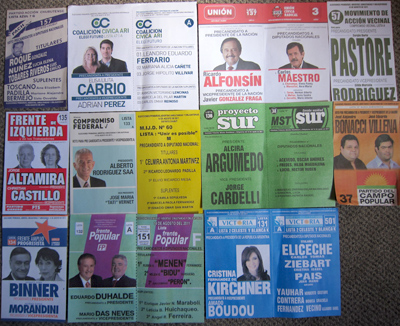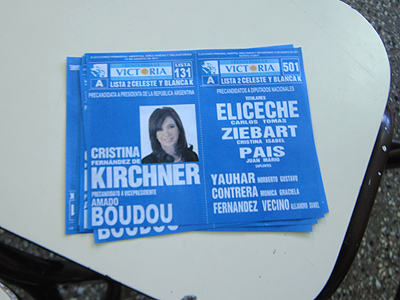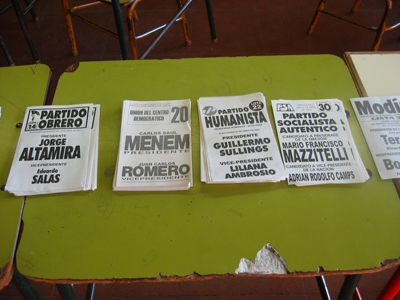
Something new on the political front: for the first time, primary elections will be held in Argentina. As the video below explains, official candidates for each political party (or the new term, agrupación política) were formerly chosen through internal party elections, conferences or merely appointed by party leaders. The idea that everyone has a chance to participate in internal party affairs seems like a good idea… but it all depends on how the system is used.
A good part of the system is that voters can cortar boletas. If they like presidential candidates from one party & senate candidates from another, they can vote for each. In other words, voters are not forced to stick to a single political party for primary elections. Each political position is voted for individually. That’s great for mixing things up & generating a lot of debate. Parties must obtain at least 1.5% of the vote in order to continue in the game.
Here’s the catch… Standard procedure in Argentina is that political parties split often. Party leaders who disagree often fail to negotiate a compromise, & each goes their own way hoping to attract a majority of followers. Good examples can be found within the annals of the UCR or for a more recent example, the political career of Elisa Carrió. Peronistas are notorious for division, with Cristina representing the Kirchner-founded Frente para La Victoria & former K supporter Eduardo Duhalde leading the Frente Popular. Both are die-hard peronistas who claim the coveted party lineage from Juan Domingo himself.

And that’s where primary elections in Argentina fail before they’ve begun. When in reality all peronistas or all socialistas should be battling it out head-to-head within a single party, anyone can simply break away & form a new party. Problem solved for the politicians, increased confusion for the electorate. Real division & new ideas are healthy, but more often than not in Argentina political parties split over questions of personal power & prestige.
But here’s the major problem… When no alternatives exist within a political party for voters to choose from, then primary election results can be used to obtain a forecast of how the presidential election in October will go. Everyone is anxious to see what percentage Cristina gets today, but that’s not the purpose of primaries. Let exit pollers get those numbers instead. The misuse of a new system generates a bad precedent & lessens the real value of primary elections.

That said, lots of electoral reform has taken place since the Kirchners have been in power. Most of it for the better, like elimnating the separation of sex during voting procedures or adding some color & design to party tickets (see 2003 pres election slips above). Publicity about these changes on a national level has been good overall. But the veda electoral remains effective, prohibiting the sale of alcoholic beverages the night before elections & for three hours after polls are closed. Somewhat outdated. And cramming so many elections into 2011 makes voting even more confusing, tiring & time-consuming. By the time presidential elections come around, no one will ever want to vote again… at least voting is mandatory & assures high turnout.
Exelentemente claro!
Gracias Leo!
Pingback: Daily Url - Aug 15th - Baexpats - Community of Expatriates in Buenos Aires, Argentina